
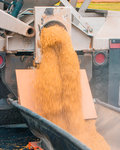

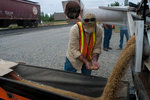
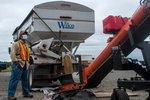

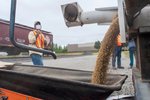
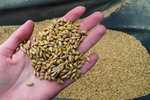
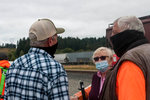

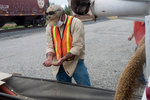
The first load of locally-grown grain was loaded onto railcars Thursday morning at the Port of Chehalis’ recently completed transload facility — marking a major milestone for the Southwest Washington Grain Project.
The grain is heading for the Great Western Malting Co. located in Vancouver.
“We’re thrilled,” said Port of Chehalis CEO Randy Mueller. “This project has been years in the making and it’s great to see it come through to completion. I’ve talked about all of the different partners — everyone from WSU to EDC to the Farm Bureau to Lewis County and all the other partners that helped make it happen.”
Creating the grain storage and loading facility has been discussed by the Port of Chehalis since 2018 after the Lewis County Farm Bureau invited Mueller and Matt Matayoshi, executive director of the Lewis Economic Development Council, to meet and discuss local farmers’ needs. One of those needs was a facility where they could store and load their grain onto train cars.
In 2018, Dave Fenn and other area farmers learned their contracts with National Frozen Foods, a local corporation that packages frozen foods for retail sale, which they relied upon for their business, had not been renewed.
Paired with Symons Frozen foods in Centralia filing for bankruptcy in 2008 and the catastrophic flooding in 2007, the farmers in the area have been struggling.
“To the best of my recollection there were 10 to 15 growers in Southwest Washington that contracted with National Frozen Foods,” said Fenn.
Those farmers with farms ranging from 100 to 500 acres found themselves without a buyer.
As a part of the Southwest Washington Grain Project, studies were conducted to identify crops that would be best for farmers to start growing. Malting barley, in particular, and grains such as winter wheat and barley, stood out for several reasons. They could be grown in the spring or winter, malting barley is a high-value crop that can be easily rotated into a crop cycle, and most importantly, buyers of the malting barley have been identified.
“Local farmers lost their market a few years ago and if they’re going to be sustainable through future generations they need to have a value-added product, which malting barley is, and hopefully they can start marketing that as local. If you are within a 90-mile radius of a brewery or distillery that’s a local product,” said local farmer and representative with the Lewis County Farm Bureau Maynard Mallonee.
Fenn has grown 200 acres of malting barley and he loaded a portion of it on a railcar on Thursday morning.
“It’s nice to get things started. This is the first big step,” he said.
Mike Peroni, the Southwest Washington Grain project manager with the Northwest Agriculture Business Center said that one of the next steps is to start marketing this grain as a local product.
“Identity preservation is a priority. We are working on branding the grain as regionally-produced and maintaining that identity through the chain of command — marketing it as Chehalis Basin grain — wheat for baking and barley for brewing. We really want to build out that brand,” Peroni said.
Aside from marketing, the next big step in the process is the building of the storage silos. Mueller said that the construction start date is dependent on the grant funding and applications have been submitted to various locations.
The Port of Chehalis has set aside 8.2 acres of land that has been dedicated to the transload and storage facility. The plan is to keep expanding the storage in the future in phases. The final facility is estimated to have a storage capacity of 3,520 tons.
“Some of those (grants) are dependent on the state budget, so obviously, depending on what happens with the state budget, there may or may not be a lot of grant funding around but we’re applying everywhere,” Mueller said.
In light of the progress on the transload facility, the Port of Chehalis updated its comprehensive plan at the Thursday port commission meeting to include agriculture as a line of business that the port is involved in and supports.
Lewis County Commissioner Edna Fund was at the transload site on Thursday morning and expressed her excitement about the project. In April of 2019, the Lewis County Commissioners approved $800,000 from the distressed counties, also referred to as the “.09 fund,” for the rail-to-truck transload facility showing the county’s support for the project.
“I’m a farmer’s daughter so agriculture is always close to my heart. It’s really nice to have something good happening during all of the COVID-19 challenges,” Fund said.